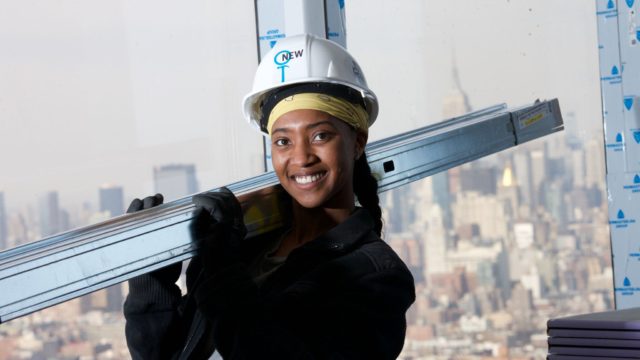This blog post was written by Sarah Echols from Nontraditional Employment for Women (NEW) for our 2018 PowHer The Vote campaign.
Across the United States, minimum wage earners are living below the poverty line, and nearly two-thirds of these minimum wage earners are women. The US Department of Labor defines a nontraditional job as one where less than 25% of the workforce is women. The disparity in wages and earning potential is striking–Structural Ironworkers are made up of only 2% women and earn $83,000 annually, while Dental Assistants, made up of over 95% women, earn less than $28,000 annually. This disparity in income and earning potential directly impacts a woman’s ability to establish the financial security necessary to succeed in the present and thrive in the future.
Nontraditional Employment for Women (NEW) believes in the impact of a construction career on skills, wealth and economic independence for women and their families. NEW’s mission of preparing, training, and placing women in careers in the skilled construction, utility, transportation and maintenance trades helps women achieve economic independence and a secure future for themselves and their families. In partnership with New York City Council members, community groups, and the building and construction trades unions, NEW participates in events and information sessions throughout the five boroughs to recruit women. In providing preapprenticeship training, NEW’s programming significantly changing the lives of women, and mainly low-income women as our efforts we especially support a career-centered workforce model that works for those who have historically not had access to a career growth trajectory.
Apprenticeship in construction is a robust career pathway that affords apprentices the opportunity to earn while they learn a skilled trade and sustain themselves and their families. Unions provide their members with a supportive workforce community, better wages, and better benefits. Since 2005 alone, 2,500 of NEW’s graduates have secured employment as union apprentices, utility workers, maintenance workers, and in other blue-collar career tracks, all of which offer built-in equal pay for their hard work. In construction trades unions, men work with women who are highly skilled, committed and have the dignity of a fair wage, which is reflected in the quality of their work. Collective bargaining in construction trades unions allows women not just pay equity but assurances of safety, wage protection, training, advancement, a seat at the negotiating table, all elements of “work life” that have women have been disproportionately denied.
Just one example of the benefits of a union career is the District Council of Carpenters, of which about 20% of NEW tradeswomen are members. First year Carpenters earn approximately $20/hour and at Journey level, they earn over $53/hour, to say nothing of the health and retirement benefits which allow New Yorkers to support their families and communities. And as they progress, they are trained, both on the job and in the classroom, by experts in their craft. These skills and networks are the core of what makes a successful career, and the core of why we do what we do.
NEW strives to provide women not only with these superior wages and superior benefits for themselves and their families, but with something intrinsic to our graduates themselves – the skills and self-worth that come with the knowledge that women can indeed do this work.


